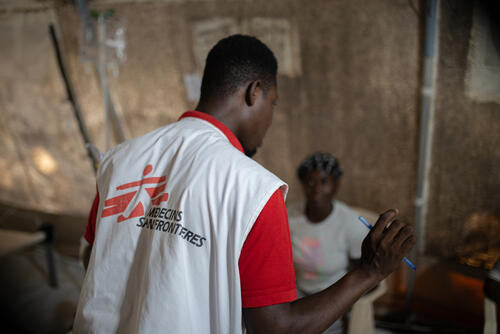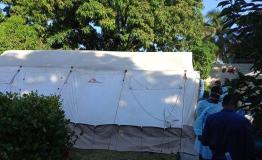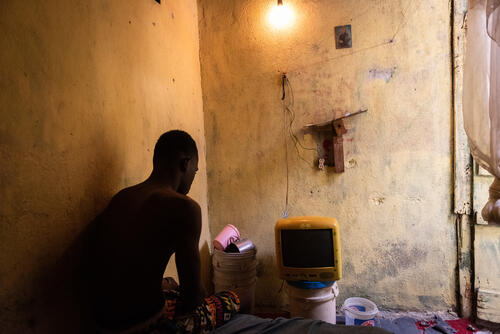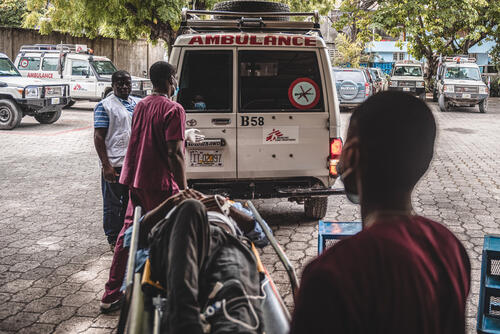- Médecins Sans Frontières (MSF) warns of a potential health disaster amidst a quickly deteriorating humanitarian situation in Haiti.
- Faced with an explosion of violence, fuel shortages, lack of clean water, and now an outbreak of cholera, people are at high risk.
- As insecurity spreads across the country, people's access to healthcare is becoming ever-more limited.
Port-au-Prince - People in Haiti are today living in dire conditions and are confronted daily with an appalling health and humanitarian situation, which continues to deteriorate, warns MSF.
Faced with an explosion of violence and fuel shortages, people are struggling to access clean water and healthcare. In addition, over the past two weeks, the country has seen a resurgence of cholera, having been declared cholera-free for over three years.
“Last week, a pregnant woman came to our hospital in Cité Soleil needing an emergency caesarean section. We tried to transfer her to a medical facility where she might find that kind of treatment, but she died,” says Dr Luxamilda Jean-Louis, MSF doctor.
“Whether it's due to insecurity on the roads, or to health structures not functioning anymore, events like this happen every day in Port-au-Prince. The situation is so volatile that it can change from one day to the next, even from one hour to the next.”
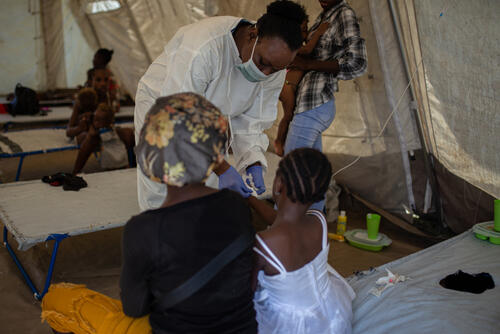
For several days now, the vast majority of hospitals in the city, which depend on generators to operate, have been forced to reduce their services and may have to close their doors because of fuel shortages.
“We are facing the same situation as other hospitals in Port-au-Prince; we will not be able to operate our medical facilities for more than a few weeks if we do not have access to fuel,” says Mumuza Muhindo, MSF's head of activities in Haiti.
“In addition, medical equipment, which we also need in order to continue to treat cholera cases and provide care to people, is currently blocked at the port,” he says.
Unsafe water is one of the main causes for the spread of cholera, so the consequences of a lack of clean water... are disastrousAuguste Ngantsélé, MSF medical coordinator in Haiti.
Our teams are deeply concerned about the resurgence of cholera, which was officially confirmed on 2 October. We have received over 100 patients with cholera-like symptoms every day during the past week in four treatment centres. These centres have been set up in the neighbourhoods of Turgeau, Drouillard in Cité Soleil, Champ de Mars and Carrefour, with a total capacity of 205 beds.
“Unsafe water is one of the main causes for the spread of cholera, so the consequences of a lack of clean water at a time when the disease has resurged, are disastrous,” says Auguste Ngantsélé, MSF medical coordinator in Haiti.
“Without drinkable water, treatment and good waste management, the risk of a spike in the number of cases is very high and this needs to be addressed urgently,” he says.
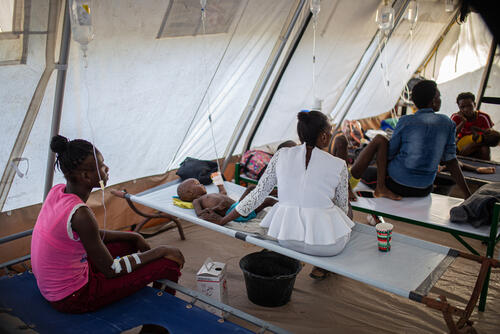
In addition to water access and the establishment of care capacities, people must also be able to access health structures. Yet, this access is a constant challenge in the Haitian capital as often it is difficult to reach a healthcare facility that is capable of providing the necessary treatment.
Our teams witness this situation every day through our medical activities, whether it be for the care of trauma patients, burns patients, vital emergencies or victims of sexual violence.
In recent days, our teams have further increased activities, strengthening the surgical capacity of some of our projects, and implementing a response to cholera, which focuses on treatment, but also on the prevention of infections.
For more than 30 years, MSF teams have been providing free medical care in Haiti. We currently run seven projects throughout the country, in the capital Port-au-Prince, in the south and in Artibonite: treating life-threatening emergencies, trauma cases, burn victims, victims of sexual violence, and providing reproductive care. We also regularly intervene in emergency situations, such as natural disasters. In 2021, our teams conducted 25,000 emergency consultations, treated 3,220 victims of violence and helped 1,560 survivors of sexual violence.



